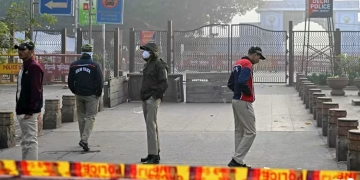What Happened
On October 29 2025, RFA announced that it would suspend its news operations starting Friday due to funding uncertainty caused by the U.S. federal government shutdown. The broadcaster, funded through the U.S. Agency for Global Media (USAGM), said it would halt production of news content, begin closing its overseas bureaus and lay off or furlough remaining staff. This marks the first time since its founding in 1996 that RFA has taken such a sweeping action.
RFA stated that, “In an effort to conserve limited resources … and preserve the possibility of restarting operations should consistent funding become available,” it was being forced into this step.
Background: Funding, Mandate & Recent Cuts
RFA was established to provide uncensored news to Asian countries where press freedom is limited—broadcasting in multiple languages including Mandarin, Burmese, Khmer, Vietnamese, Korean, Uyghur and others.
The U.S. Congress appropriates funding for RFA and its sister networks under USAGM. However, in early 2025 the Trump administration moved to drastically cut funding to USAGM-funded broadcasters. In March 2025, the administration directed the termination of grants to RFA and other networks.
Earlier this year a federal judge ordered that the administration restore funding to these outlets, ruling that the executive branch could not unilaterally dismantle them given Congressional appropriations.
Despite the ruling, the funding flow remained uncertain. The U.S. government shutdown added delays, pushing RFA into the pivotal decision to suspend operations.
Why It Matters
1. Press Freedom & Geopolitics
RFA’s mission has been especially valuable in countries with restricted media environments—such as China, North Korea, Myanmar and Cambodia. Its multilingual services often provided rare independent journalism on issues like Uyghur rights, Tibet, Myanmar’s coup and human rights.
With RFA halting broadcasts, media analysts warn that authoritarian regimes may breathe easier—state-backed outlets may fill the void, and independent reporting on vital issues may shrink. For example, China has already expanded its own radio frequencies to cover vacated ones after RFA’s service reductions.
2. U.S. Soft Power & Information Strategy
The U.S.’s investment in international broadcasting has long served as a tool of soft power—promoting free press, democracy and providing an alternative to state propaganda abroad. RFA’s suspension undermines this role. The Washington Post called it a significant blow.
3. Operational & Institutional Impacts
Hundreds of RFA employees were already on unpaid leave or furloughed earlier in the year when cuts hit. Now the full shut-down means bureaus abroad will close, language services will end and many journalists will lose jobs. This affects not just staff, but the capacity of RFA to restart fully when funding is restored.
4. Implications for the U.S. Media Landscape
Domestically, this move underscores how political decisions and fiscal standoffs (like a government shutdown) can trickle into global media operations. It signals to other public-media outlets that funding uncertainties carry existential risk.
Key Details & Timeline
- March 2025: Trump administration issues directive cutting USAGM funding to RFA and related organizations.
- April 2025: A federal judge blocks full dismantling of these broadcasters under the law.
- Throughout 2025: RFA begins shuttering language services (Uyghur, Tibetan, Lao, etc.), laying off staff and reducing output.
- Late October 2025: With the U.S. government shutdown unresolved, RFA announces full suspension of news operations effective Friday, closure of bureaus, layoffs.
Reactions & Broader Responses
- RFA executive editor Rosa Hwang condemned the suspension as “excruciating” and warned that authoritarian regimes are already celebrating its demise.
- Analysts note the shutdown is a “gift to dictators” and that RFA’s role as a watchdog in closed societies cannot be easily replaced.
- China and Cambodia publicly welcomed the funding cuts and the weakening of RFA as removing critical voices.
- Congressional and diplomatic voices critical of the move warn that the U.S. is losing the information war abroad while adversaries escalate their media outreach.
What This Means Going Forward
Will RFA Restart?
RFA frames the shutdown as temporary, saying that once consistent funding returns, operations could resume. But restarting won’t be simple: rebuilding bureaus, rehiring journalists, reestablishing credibility and operations takes time and resources.
Regional Media Gaps
Listeners to RFA in Asia—particularly minorities like Uyghurs and Tibetans—will lose independent news services. State-backed outlets may fill the gap. The information environment in these regions could become narrower.
U.S. Global Competitiveness in Information
As Western-funded broadcasters wind down, rival powers (China, Russia) expand state media abroad. The gap in independent news services undermines U.S. influence in the global information space.
Domestic Accountability & Funding Mechanisms
The suspension reveals how dependent news organisations are on timely, predictable public funding. When that flow is disrupted by politics, journalism is vulnerable. It raises questions about how public-media funding should be structured to avoid undue influence or shutdown risk.
Why the Government Shutdown Is Key
The U.S. government shutdown cut off timely funding and created uncertainty. Even if appropriations exist, agencies like USAGM could not disburse funds or operate normally. RFA cited the shutdown directly as a trigger.
In effect, the shutdown means that legal appropriations cannot always translate into operational cash flow. For a media organisation dependent on federal grants, this creates existential risk.
Final Thoughts
The suspension of RFA’s news operations amid the U.S. government shutdown highlights multiple intersecting issues:
- The fragility of public-media organisations when funding and political will shift.
- The strategic importance of international broadcasting in the struggle for information influence.
- The practical effect on local audiences in authoritarian contexts who rely on independent outlets.
- The ripple effects domestically: how fiscal politics alter global media capabilities.
As RFA pauses, it leaves a vacuum—not only operationally, but symbolically. It raises urgent questions: who will fill the gap? How will the U.S. maintain credibility as a supporter of press freedom abroad when one of its key outlets goes silent? And what happens to the people who depended on its reporting?
In an era when information is as much a tool of diplomacy and power as a product, the decisions taken in Washington have real-world consequences across continents. The RFA story may very well mark a turning point in how and whether U.S.-funded media can continue to play a global role in a fractured, contested media landscape.












